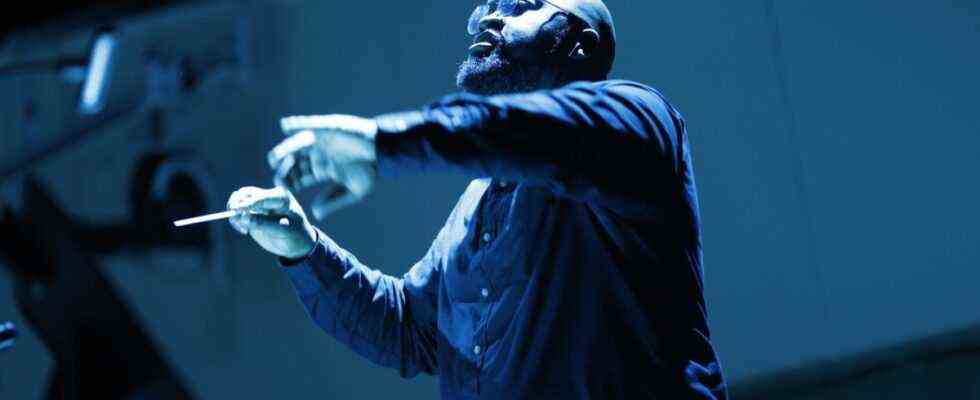The composer Heiner Goebbels, who will be 70 years old next year, was a co-founder of the “so-called radical left-wing wind orchestra” in the 1970s. The fact that he still loves cross-talk and lateral thinking is obvious in Berlin’s Philharmonie. There the conductor of the “Ensemble Modern Orchestra” does not stand in the front center in front of the musicians playing frontal to the audience. No, Vimbayi Kaziboni, bursting with energy, is standing on the far right, the strings sit across the usual orchestral line-up in half profile to the audience. In the background six percussionists, a huge dulcimer (cymbalone), classical and electric guitar, accordion, electric piano and the first double bass player sometimes also plays the electric bass, all musicians are amplified electronically.
So begins the Musikfest Berlin, the big performance show of the capital and invited orchestras with the world premiere of Heiner Goebbels’ non-stop 100-minute “A House of Call”, which, like all Goebbels pieces, is cheered by the 1000 authorized listeners. The piece is a mega-symphony in fifteen parts and ultimately no less than the sum of the lateral thinking of this wonderful anti-composer, who with his music theater pieces (“Eisler material”) has always and now again the balancing act between philosophy, rock, resistance, avant-garde and Succeeds with the public.
“A House of Call” is a life diary that completely misses the acoustic world of Heiner Goebbels. Avant-garde is coupled with free jazz, pop rhythm with microtonality, religion with politics, literature with traditional music, and hardcore aesthetics with a shamelessly beautiful mix of styles. Of course, Goebbels by no means neglects his great and hymnically revered favorite artists, James Joyce, Heiner Müller, John Cage, Samuel Beckett, Pierre Boulez. Vimbayi Kaziboni and the Ensemble Modern, which has long been committed to the quiet rebel Goebbels, dance and rock their way through his memories for almost two hours. They are allowed to perform a reggae, they hammer, they accentuate the voice of Goebbels one hundred year old mother in some Eichendorff verses and finally chant Samuel Beckett’s last text “What When Words Gone” in simple and only minimally changing chords.
Unfortunately, when folk songs are edited, everything that is unruly is often lost
So this fascinating evening closes with a secular prayer, becomes a requiem for the upward and downward movements of Central European music of the last 50 years, which opened up from the ivory tower of the classic, which was often turned away from the world, to the world, without ever the special achievements of Central European classical music to give up. Heiner Goebbels is the central and most successful figure in this opening, someone who always exposes himself to the dangers of crossover and pop, but who, thanks to his cross skull, is always overwhelmed by coherence.
So now this Requiem, this “House of Call”, this exchange for votes. The title is a quote from James Joyce’s riddle book “Finnegans Wake”, page 41, where the neologism “roratorios”, already taken up by John Cage, can be found, which is wonderfully suitable as a generic name – Röhratorion – for this magnum opus. Here Goebbels snatches voices from oblivion, not only the voices of his favorite poets mentioned, but also many historical recordings that impressed him and have accompanied him through life. These are often ancient and scratchy recordings of traditional music that are played in by the band, like to get caught in loops, thwarted, drowned out and caressed by the orchestra.
Folksong arrangements are an old and lucrative genre that Beethoven already used. Usually the musically unruly character of these chants is leveled by the asepsis of classical music, microtonality and rhythm are castrated, the roughness of the voices (“grain de la voix” comes from Roland Barthes, another Goebbels favorite) is given by the smooth vocal ideal of the Concert halls straightened. Only Béla Bartók, Manuel de Falla and above all Luciano Berio found a way out of this dilemma.
Heiner Goebbels lets acoustic found objects proliferate in his imagination – until they grow into independent pieces.
(Photo: Uros Hocevar / kolektiffimages)
Many of the early recordings taken up by Goebbels reveal a frightening connection between oppression and traditional music. Such are the photographs of Georgian prisoners of war taken in Frankfurt an der Oder in 1916. Or the famous Armenian folk song “Krunk”, arranged by the legendary singer, priest and ethnomusicologist Komitas, sung by two stars of Armenian music, Armenak Shahmuradian (1914) and Zabelle Panosian (1917). With this Goebbels reminds of the genocide against the Armenians. A recording of the chorale “Nun danket alle Gott”, sung in Nama, in what was then German South West Africa in 1931, evokes the genocide of the Hereros.
A third of the 15,000 wax cylinder recordings in the Berlin Phonogram Archive up to 1954 – this chorale recording can also be found there – was made in African colonies. This is what it says in the material edition for the “House of Calls” (Neofelis Verlag, 140 pages, 9 euros), which provides a fascinating history of sound culture of the 20th century and provides deep drilling into this sounding music history that the listener does not need to understand but is exciting and illuminating to read.
In his headings, Goebbels takes up tone coloration, melismatics, rhythm, intensity of the originals, he thinks, dreams and composes them further, contaminating them with every conceivable refinement of classical music, with minimal music patterns, cascades of percussion and puzzles. Towards the end he bows shortly before Karlheinz Stockhausen’s “Mantra”, he allows sentimentality, comes out as a believer and romantic. The acoustic finds have continued to grow in his imagination and have grown into independent pieces that, on the one hand, never slander their respectfully cherished original, and on the other, fit harmoniously into the fifteen-part suite called “A House of Call”, Goebbel’s most mature and most complete masterpiece.

